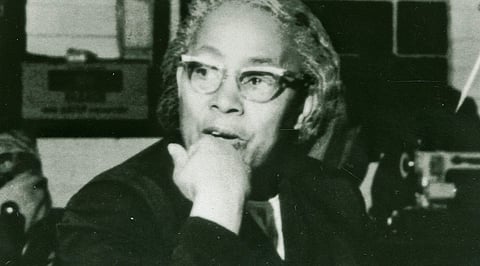31 Days of Revolutionary Women, #05: Septima Clark
ByElizabeth Hunter
In honor of Women's History Month, we'll be posting one story each day of March written by local citizen journalists about a revolutionary woman from history or today who has inspired them as women.
As we find ourselves again in the midst of presidential campaigning, a reminder of our right to vote is important. Perhaps particularly so with the continuing concern of voter suppression in some states that have sought Congressional and Supreme Court review of the Voting Rights Act of 1965.
We as individuals vote as it is our choice to do so. What about those who were denied that right arbitrarily by state? From 1890-1908, 10 former Confederate states passed amendments to make voter registration difficult for those they wished to deny the vote. Literacy tests and poll taxes resulted in a sharp decline in eligible voters. These practices were most unjustly borne by African Americans. Septima Poinsette Clark sought to change this through education and development of citizenship schools.
Born in 1898 in Charleston, South Carolina, Septima's father (a former slave) and mother (a laundress), both prized education, and particularly encouraged their girls to succeed. Septima completed high school in 1916 to begin teaching in a John's Island school as Charleston did not allow blacks to teach. Returning to Charleston in 1919 to teach in a private school for black children, she joined the National Association for the Advancement of Colored People (NAACP) to advocate for equal pay between white and black teachers, as well to address the racism experienced in Charleston. Teaching children by day and illiterate adults at night, Septima believed that education provided the individual with self-pride and citizen empowerment. This drove Septima to in turndevelop literacy and citizenship workshops while also earning her Bachelors and Masters degrees.
In 1945, working with Thurgood Marshall, they continued her fight for equal teacher pay, which they won. In 1956 she became Vice President of the NAACP in Charleston. After losing her teaching position with the state due to activism in the civil rights movement, she found employment with the Highlander Folk School in Tennessee, one of the few interracial schools in the south. Clark continued to develop her literacy courses with the intent to connect politics of the movement to the needs of the people's citizen rights. Her development of leaders for the movement through these courses caught the attention of the Southern Christian Leadership Conference and thus the Highlander School was incorporated into their Crusade for Citizenship in 1961. With this increased financial support of the SCLC, 10,000 citizenship teachers were trained throughout the south and 800 citizenship schools created.
Septima Clark became the director of education for the SCLC and she was the first woman to serve on their executive board. She retired in 1970 at the age of 72. President Jimmy Carter awarded Septima Clark a Living Legacy Award in 1979. Her 2nd autobiography, Ready from Within, Septima Clark and the Civil Rights Movement won the American Book Award in 1986. Referred to as "Mother of the Movement" by Martin Luther King, he requested Septima Clark accompany him to Norway for his acceptance of the Nobel Peace Prize in 1964 as his recognition of her contribution to the movement.
Septima Poinsette Clark died in 1987 at the age of 89 leaving a legacy of commitment to the civil rights struggle through education.
Elizabeth Hunter is a retired R.N., M.P.H. who stays busy finding purpose in community within a world view and for a new adventure.
📸 Featured Image: "Photograph of Septima Clark, ca. 1960" is licensed under CC BY 4.0
Help keep BIPOC-led, community-powered journalism free — become a Rainmaker today.


